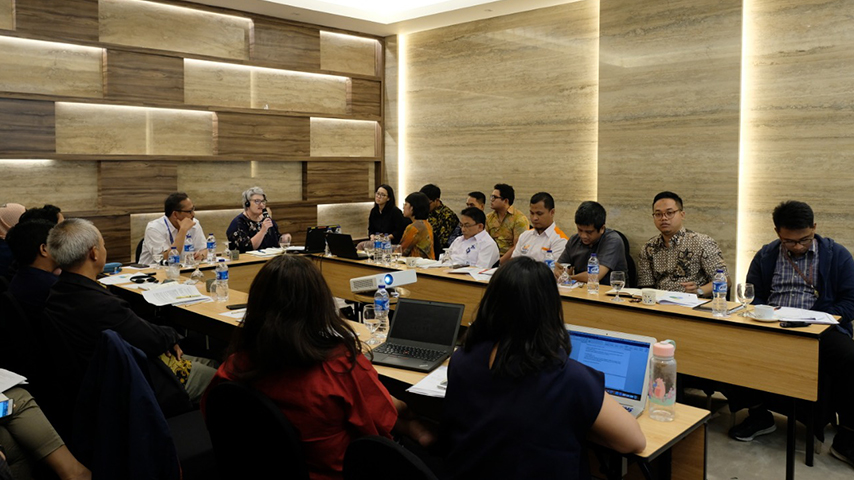Research management is increasingly complex, and requires specialist skills, beyond those of academics and bureacrats.
This was the message from Professor Veronica Taylor from the Australian National University (ANU) at a knowledge sharing session on research funding in Hotel Ashley, Jakarta, on Thursday (7/2). The discussion was hosted by the Knowledge Sector Initiative (KSI) and the Ministry of National Development Planning/National Development Planning Board (Bappenas) and attended by representatives from the Ministry of Research, Technology and Higher Education, Ministry of Finance, Indonesian Academy of Sciences (AIPI), Education Endowment Fund (LPDP), Indonesian Science Fund (DIPI), Indonesian Institute of Sciences (LIPI), National Nuclear Energy Agency (Batan), and others.
Research funding in Australia
Professor Taylor explained that government research funding in Australia is managed by three agencies: the Australian Research Council (ARC), which manages research funds from the Ministry of Education and Training; the National Health and Medical Research Council (NHMRC), which manages research funds from the Ministry of Health; and Science and Innovation, under the Ministry of Industry, Innovation and Technology.
“All three are independent bodies, not part of any ministry, although they get their funding from ministries,” she said. Several other ministries also manage research funds, including the Ministry of Defense and the Ministry of Foreign Affairs.
These agencies manage the entire grant process, from grant applications to selection, administration, reporting, and auditing.

Professional research management
The ARC, NHMRC and Science and Innovation Australia are staffed by professional research managers from diverse backgrounds and disciplines. Universities also have research management specialists who support researchers in applying for and managing research grants.
Professional research management ensures that funds that are managed in a transparent and accountable way. Research proposals are cross-checked to ensure that they are not being funded by other institutions.
“Transparency is key. The names of research grantees are published on the website to promote transparency,” said Professor Taylor.
Quality assurance and research integrity
All of the research funds are provided on a competitive basis. One of the most important parts of the selection process is double-blind peer review. Peer reviews are sent to an independent evaluation committee made up of experts in the field. Peer reviewers and members of the evaluation committee are able to see each others’ comments and track the progress of the review process in an online system.
Recommendations from the review process are submitted to the head of each research agency. The relevant Minister then provides final approval of research grants.
“Even though technically the research funds originate from the ministries, the ministries cannot interfere in the selection process,” said Professor Taylor.
The progress of research projects is proactively managed. Projects which are not meeting expectations are noted as underperforming. This impacts on both the researcher and the university. In some cases, universities are required to return research funds.
All research projects must be led by a full-time academic. A number of grant schemes promote international collaboration in research. In some cases up to 50 percent of the researchers are from other countries.
To ensure research integrity, Australia introduced a Code for the Responsible Conduct of Research in 2013. All universities have ethics committees and robust processes for ethics approval for any research carried out by academics or postgraduate students. ARC, NHMRC and Science and Innovation also have policies on research ethics and research integrity. They are also regularly audited.
Links with industry
To help link research to the needs of industry, Australia has promoted collaborative research through a number of its grant schemes where the government matches the amount of funding provided by companies. Other incentives have also been introduced to encourage private sector investment in research. “Companies that provide research funding get tax breaks,” she said.
Maintaining the integrity of research conducted through industry partnersips is critical. Some universities in Australia have been criticised for prioritising the interests of industry over research ethics and university autonomy.
Professor Taylor emphasised that the design of Australia’s research funding schemes had evolved to address Australia’s unique challenges. While this model should not be adopted uncritically, some key principles could be identified, including independence, merit-based competition, transparency, professional mangement, and research integrity. These principles stand whether there is one, two or three agencies managing research funding.
To access and download the presentation slide, click here: https://drive.google.com/open?id=1fbnu9BQC5cAZ2dnE0qBQQZ9JhPE4ueWV






